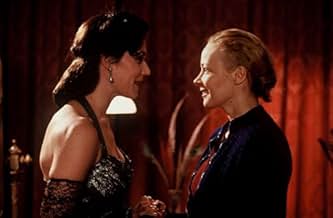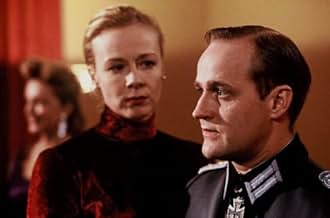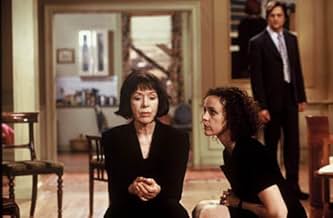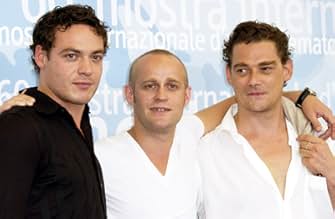IMDb रेटिंग
6.7/10
2.6 हज़ार
आपकी रेटिंग
अपनी भाषा में प्लॉट जोड़ेंAfter the death of her father, Hannah becomes concerned with the strange behavior of her mother. As her mother's troubled childhood is revealed, Hannah realizes how little she ever knew.After the death of her father, Hannah becomes concerned with the strange behavior of her mother. As her mother's troubled childhood is revealed, Hannah realizes how little she ever knew.After the death of her father, Hannah becomes concerned with the strange behavior of her mother. As her mother's troubled childhood is revealed, Hannah realizes how little she ever knew.
- निर्देशक
- लेखक
- स्टार
- पुरस्कार
- 9 जीत और कुल 3 नामांकन
फ़ीचर्ड समीक्षाएं
"Rosenstrasse" is a defense of naive Righteous Gentiles, the women who married secular Jews in Germany as the Nazis rose to power.
Like "The Pianist," it goes out of its way to distinguish between Nazis and natives who thought this too shall pass and noble Prussian culture would again assert itself (I couldn't pick up all the cultural references, particularly in the German music selections, though soldiers are seen dancing to Cole Porter songs.).
While the promotion for the film claims that feminist director Margarethe von Trotta is the first to deal with this particular slice of German protest to the Nazi eradication of Jews, a series of German films not otherwise distributed in the U.S. were shown on PBS some years ago and demonstrated that other post-war filmmakers were looking at complicity and professed ignorance among their country people, and that their discovery of their parents' hypocrisy led to the radical politics of 1968.
Von Trotta carefully avoids this context by oddly having her seeker of truth be a young American woman who grew up speaking German fluently in the German Jewish emigre enclave of Washington Heights in Manhattan (from whence came Henry Kissinger) and has a South American boyfriend.
Somewhat clumsily for the narrative and for the family, her father's death leads her to investigate her mother's past in Germany to try and figure out why her cold, secular mother is suddenly following shiva (Jewish mourning rituals) for him. (These rituals are disconcertingly portrayed inaccurately -- What rule of silence? Everyone would be talking about memories of the deceased, and eating and eating-- unless the point is to show they don't know how to follow Jewish tradition anymore and talk of any past is verboten in this family).
The film unravels, not particularly satisfactorily, many layers of irony and guilt as personal and political realities are intertwined --
between Germans (especially soldiers who had witnessed what the S.S. was doing in the East, showing it was not a secret at home); between gentiles and Jews (particularly about intermarriage then and now); between survivors and the dead; between men and women (there's an assertion that gentile men deserted their Jewish wives to their fates while gentile women did not desert their spouses); between mothers and children, whether biologically linked or not; between siblings, and,between chance and choice.
Katja Riemann's strong performance as the stubborn wife who accidentally becomes an activist by default almost puts aside the fact that her character was monumentally oblivious to what was happening around her until it was almost too late by a thread.
The conclusion seems to come out in favor of compromise as it explores love and tradition, which is inevitably not happy for everyone but may be a flexible response to a complicated past and present.
Like "The Pianist," it goes out of its way to distinguish between Nazis and natives who thought this too shall pass and noble Prussian culture would again assert itself (I couldn't pick up all the cultural references, particularly in the German music selections, though soldiers are seen dancing to Cole Porter songs.).
While the promotion for the film claims that feminist director Margarethe von Trotta is the first to deal with this particular slice of German protest to the Nazi eradication of Jews, a series of German films not otherwise distributed in the U.S. were shown on PBS some years ago and demonstrated that other post-war filmmakers were looking at complicity and professed ignorance among their country people, and that their discovery of their parents' hypocrisy led to the radical politics of 1968.
Von Trotta carefully avoids this context by oddly having her seeker of truth be a young American woman who grew up speaking German fluently in the German Jewish emigre enclave of Washington Heights in Manhattan (from whence came Henry Kissinger) and has a South American boyfriend.
Somewhat clumsily for the narrative and for the family, her father's death leads her to investigate her mother's past in Germany to try and figure out why her cold, secular mother is suddenly following shiva (Jewish mourning rituals) for him. (These rituals are disconcertingly portrayed inaccurately -- What rule of silence? Everyone would be talking about memories of the deceased, and eating and eating-- unless the point is to show they don't know how to follow Jewish tradition anymore and talk of any past is verboten in this family).
The film unravels, not particularly satisfactorily, many layers of irony and guilt as personal and political realities are intertwined --
between Germans (especially soldiers who had witnessed what the S.S. was doing in the East, showing it was not a secret at home); between gentiles and Jews (particularly about intermarriage then and now); between survivors and the dead; between men and women (there's an assertion that gentile men deserted their Jewish wives to their fates while gentile women did not desert their spouses); between mothers and children, whether biologically linked or not; between siblings, and,between chance and choice.
Katja Riemann's strong performance as the stubborn wife who accidentally becomes an activist by default almost puts aside the fact that her character was monumentally oblivious to what was happening around her until it was almost too late by a thread.
The conclusion seems to come out in favor of compromise as it explores love and tradition, which is inevitably not happy for everyone but may be a flexible response to a complicated past and present.
I'm always surprised about how many times you'll see something about World War 2 on the German national television. You would think they don't like to open old wounds, but there isn't a week that goes by without a documentary or a movie about the horror and atrocities of this war. Perhaps it's a way of dealing with their past, I don't know, but you sure can't blame them of ignoring what happened. And it has to be said: most of those documentaries are really worth a watch because they never try to gloss over the truth and the same can be said about their movies (think for instance about "Der Untergang" or "The Downfall" as you might now it) which are also very realistic.
One of those movies is "Rosenstrasse". It tells a true story and deals with the subject of the mixed marriages during the war, even though the movie starts with a family in the USA, at the present day. After Hannah's father died, her mother all a sudden turned into an orthodox Jew even though she hasn't been very religious before. She doesn't know where the strange behavior of her mother comes from, but as she starts digging in her mother's troubled childhood, Hannah understands how little she has ever known about her mother's past.
The fact that this movie deals with the subject of the mixed marriages during the Nazi regime is already quite surprising. For as far as I know, there hasn't been another movie that deals with this subject. (For those who didn't know this yet: Being married to a so-called pure Aryian man or woman meant for many Jews that they weren't immediately sent to one of the concentration camps, but that they had to work in a factory). But it does not only tell something about the problems of the mixed marriages, it also gives a good idea of how these people were often seen by their own parents and relatives. How difficult it sometimes was for them during the Nazi regime and how these people, most of the time women, did everything within their power to free their men, once they were captured and locked away in for instance the Rosenstrasse...
The acting is really good and the story is very well written, although the way it was presented in the beginning didn't really do it for me (and that's exactly the only part that you'll get to see in the trailer). Perhaps it's just me, but I would have left out a big part of what happens in the present day. At least of the part that is situated in the USA, because the part where Hannah goes to Berlin and talks to someone who knows more about her mother's past, definitely works.
If you are interested in everything that has something to do with the Second World War, and if you aren't necessarily looking for a lot of action shots, than this is definitely a movie you should see. This isn't a movie in which you'll see any battles or gunfights, but it certainly is an interesting movie, because it gives you an idea about an aspect of the war only little is known of. I give it an 8/10.
One of those movies is "Rosenstrasse". It tells a true story and deals with the subject of the mixed marriages during the war, even though the movie starts with a family in the USA, at the present day. After Hannah's father died, her mother all a sudden turned into an orthodox Jew even though she hasn't been very religious before. She doesn't know where the strange behavior of her mother comes from, but as she starts digging in her mother's troubled childhood, Hannah understands how little she has ever known about her mother's past.
The fact that this movie deals with the subject of the mixed marriages during the Nazi regime is already quite surprising. For as far as I know, there hasn't been another movie that deals with this subject. (For those who didn't know this yet: Being married to a so-called pure Aryian man or woman meant for many Jews that they weren't immediately sent to one of the concentration camps, but that they had to work in a factory). But it does not only tell something about the problems of the mixed marriages, it also gives a good idea of how these people were often seen by their own parents and relatives. How difficult it sometimes was for them during the Nazi regime and how these people, most of the time women, did everything within their power to free their men, once they were captured and locked away in for instance the Rosenstrasse...
The acting is really good and the story is very well written, although the way it was presented in the beginning didn't really do it for me (and that's exactly the only part that you'll get to see in the trailer). Perhaps it's just me, but I would have left out a big part of what happens in the present day. At least of the part that is situated in the USA, because the part where Hannah goes to Berlin and talks to someone who knows more about her mother's past, definitely works.
If you are interested in everything that has something to do with the Second World War, and if you aren't necessarily looking for a lot of action shots, than this is definitely a movie you should see. This isn't a movie in which you'll see any battles or gunfights, but it certainly is an interesting movie, because it gives you an idea about an aspect of the war only little is known of. I give it an 8/10.
Goebbels motivation in backing down was not explored. In the aftermath of Stalingrad the Reich had decided to go for 'total war'. This is referred to in the film. Part of this was to use women in the war effort, which Germany had not previously done to any great extent. An SS massacre of women would have faced Goebbels with a public relations disaster of massive proportion. His preference was to make the problem go away as quietly as possible, on the basis that the Jewish men could always be rounded up later. I understand the majority survived the war.
His other problem was that the 'Red' Berlin had never been very enthusiastically behind the Nazi cause and had to be handled cautiously. Again a massacre of women could have cost the Nazis what mediocre level of support they had in their capital city.
It was interesting that the majority of SS uniforms showed patches which indicated that the men wearing them were not of German nationality, but were from German origins in other countries such as Lithuania or Latvia
His other problem was that the 'Red' Berlin had never been very enthusiastically behind the Nazi cause and had to be handled cautiously. Again a massacre of women could have cost the Nazis what mediocre level of support they had in their capital city.
It was interesting that the majority of SS uniforms showed patches which indicated that the men wearing them were not of German nationality, but were from German origins in other countries such as Lithuania or Latvia
Another small piece of the vast picture puzzle of the Holocaust is turned face up in this docudrama about the Rosenstrasse Protest in Berlin, an event I had not known of, that began in late February, 1943. The details are given in an addendum that follows this review.
The film narrative sets the story of this protest within another, contemporary story that begins in New York City, in the present. Here a well off, non-observant Jewish woman, whose husband has just died, shocks her children and others by insisting on an extremely orthodox mourning ritual. She goes even further, demanding that her daughter's non-Jewish fiancé leave the house.
The distressed daughter, Hannah (Maria Schrader) then learns for the first time from an older cousin that during WWII, in Berlin, her mother, then 8 years old, had been taken in and protected by an Aryan woman. Hannah drops everything, goes to Berlin, and finds this woman, Lena Fischer, now 90. Hannah easily persuades the woman to tell her story. It all seems rather too pat.
The film thereafter improves, focusing through long flashbacks primarily on the events of 1943 that surrounded the protest, in which the fictitious central character is the same Mrs. Fischer at 33 (played magnificently by Katja Riemann), a Baroness and accomplished pianist who is married to Fabian (Martin Feifel), a Jewish concert violinist, one of the men detained at the Rosenstrasse site.
The narrative does briefly weave back to the present from time to time and also ends in New York City once again. While scenes in the present are color saturated, the 1943 scenes are washed out, strong on blue-gray tones.
The quality of acting is generally quite good, what we might expect given the deep reservoir of talent in Germany and the direction of Margarethe von Trotta, New German Cinema's most prominent female filmmaker, herself a former actress.
The story of the protest is told simply. Only one feature is lacking that would have helped: still-text notes at the end indicating the eventual outcome for those people taken into custody at Rosenstrasse, an outcome that was, as the addendum below makes clear, incredibly positive.
"Rosenstrasse" has not fared well in the opinions of most film critics. Overly long, needlessly layered, purveyor of gender stereotypes, manipulative with music: so go the usual raps. It is too long. But I found in this film an austere, powerful, spontaneous and entirely convincing voice of protest from the women who kept the vigil outside the place on Rosenstrasse where their Jewish relatives and others were detained. I found nothing flashy, contemporary or manipulative in this depiction.
The very absence of extreme violence (no one is shot or otherwise physically brutalized) intensified my tension, which increased incrementally as the film progressed. You keep waiting for some vicious attack to begin any minute. The somberness of the film stayed with me afterward. I awoke often later in the night I saw the film, my mind filled with bleak, melancholic, chaotic images and feelings conjured by the film. For me, that happens rarely. (In German and English). My rating: 8/10 (B+). (Seen on 05/31/05). If you'd like to read more of my reviews, send me a message for directions to my websites.
Add: The Rosenstrasse Protest: Swept up from their forced labor jobs in what was meant to be the Final Roundup in the national capital, 1700 to 2000 Jews, mostly men married to non-Jewish women, were herded into Rosenstrasse 2-4, a welfare office for the Jewish community in central Berlin.
Because these Jews had German relatives, many of them highly connected, Adolf Eichmann hoped that segregating them from other prisoners would convince family members that their loved ones were being sent to labor camps rather than to more ominous destinations in occupied Poland.
Normally, those arrested remained in custody for only two days before being loaded onto trains bound for the East. But before deportation of prisoners could occur in this case, wives and other relatives got wind of what was happening and appeared at the Rosenstrasse address, first in ones and twos, and then in ever-growing numbers.
Perhaps as many as six thousand participated in the protest, although not all at the same time. Women demanded back their husbands, day after day, for a week. Unarmed, unorganized, and leaderless, they faced down the most brutal forces at the disposal of the Third Reich.
Joseph Goebbels, the Gauleiter (governor or district leader) of Berlin, anxious to have that city racially cleansed, was also in charge of the nation's public morale. On both counts he was worried about the possible repercussions of the women's actions. Rather than inviting more open dissent by shooting the women down in the streets and fearful of jeopardizing the secrecy of the "Final Solution," Goebbels with Hitler's concurrence released the Rosenstrasse prisoners and even ordered the return of twenty-five of them who already had been sent to Auschwitz!
To both Hitler and Goebbels, the decision was a mere postponement of the inevitable. But they were mistaken. Almost all of those released from Rosenstrasse survived the war. The women won an astonishing victory over the forces of destruction. (Adapted from an article posted at the University of South Florida website, "A Teacher's Guide to the Holocaust.")
The film narrative sets the story of this protest within another, contemporary story that begins in New York City, in the present. Here a well off, non-observant Jewish woman, whose husband has just died, shocks her children and others by insisting on an extremely orthodox mourning ritual. She goes even further, demanding that her daughter's non-Jewish fiancé leave the house.
The distressed daughter, Hannah (Maria Schrader) then learns for the first time from an older cousin that during WWII, in Berlin, her mother, then 8 years old, had been taken in and protected by an Aryan woman. Hannah drops everything, goes to Berlin, and finds this woman, Lena Fischer, now 90. Hannah easily persuades the woman to tell her story. It all seems rather too pat.
The film thereafter improves, focusing through long flashbacks primarily on the events of 1943 that surrounded the protest, in which the fictitious central character is the same Mrs. Fischer at 33 (played magnificently by Katja Riemann), a Baroness and accomplished pianist who is married to Fabian (Martin Feifel), a Jewish concert violinist, one of the men detained at the Rosenstrasse site.
The narrative does briefly weave back to the present from time to time and also ends in New York City once again. While scenes in the present are color saturated, the 1943 scenes are washed out, strong on blue-gray tones.
The quality of acting is generally quite good, what we might expect given the deep reservoir of talent in Germany and the direction of Margarethe von Trotta, New German Cinema's most prominent female filmmaker, herself a former actress.
The story of the protest is told simply. Only one feature is lacking that would have helped: still-text notes at the end indicating the eventual outcome for those people taken into custody at Rosenstrasse, an outcome that was, as the addendum below makes clear, incredibly positive.
"Rosenstrasse" has not fared well in the opinions of most film critics. Overly long, needlessly layered, purveyor of gender stereotypes, manipulative with music: so go the usual raps. It is too long. But I found in this film an austere, powerful, spontaneous and entirely convincing voice of protest from the women who kept the vigil outside the place on Rosenstrasse where their Jewish relatives and others were detained. I found nothing flashy, contemporary or manipulative in this depiction.
The very absence of extreme violence (no one is shot or otherwise physically brutalized) intensified my tension, which increased incrementally as the film progressed. You keep waiting for some vicious attack to begin any minute. The somberness of the film stayed with me afterward. I awoke often later in the night I saw the film, my mind filled with bleak, melancholic, chaotic images and feelings conjured by the film. For me, that happens rarely. (In German and English). My rating: 8/10 (B+). (Seen on 05/31/05). If you'd like to read more of my reviews, send me a message for directions to my websites.
Add: The Rosenstrasse Protest: Swept up from their forced labor jobs in what was meant to be the Final Roundup in the national capital, 1700 to 2000 Jews, mostly men married to non-Jewish women, were herded into Rosenstrasse 2-4, a welfare office for the Jewish community in central Berlin.
Because these Jews had German relatives, many of them highly connected, Adolf Eichmann hoped that segregating them from other prisoners would convince family members that their loved ones were being sent to labor camps rather than to more ominous destinations in occupied Poland.
Normally, those arrested remained in custody for only two days before being loaded onto trains bound for the East. But before deportation of prisoners could occur in this case, wives and other relatives got wind of what was happening and appeared at the Rosenstrasse address, first in ones and twos, and then in ever-growing numbers.
Perhaps as many as six thousand participated in the protest, although not all at the same time. Women demanded back their husbands, day after day, for a week. Unarmed, unorganized, and leaderless, they faced down the most brutal forces at the disposal of the Third Reich.
Joseph Goebbels, the Gauleiter (governor or district leader) of Berlin, anxious to have that city racially cleansed, was also in charge of the nation's public morale. On both counts he was worried about the possible repercussions of the women's actions. Rather than inviting more open dissent by shooting the women down in the streets and fearful of jeopardizing the secrecy of the "Final Solution," Goebbels with Hitler's concurrence released the Rosenstrasse prisoners and even ordered the return of twenty-five of them who already had been sent to Auschwitz!
To both Hitler and Goebbels, the decision was a mere postponement of the inevitable. But they were mistaken. Almost all of those released from Rosenstrasse survived the war. The women won an astonishing victory over the forces of destruction. (Adapted from an article posted at the University of South Florida website, "A Teacher's Guide to the Holocaust.")
Rosenstrasse is more an intimate film than one of epic proportions, which could have kept away many film goers looking for a Pianist similar plot. Fortunately, Von Trotta, a good screenwriter, opts for a feminist peep to an era too much illustrated on its colorful exterior, but too little analyzed in terms of intimacy and from the point of view of ordinary Aryan German rather from a Jewish standpoint. Rosentrasse finds its strength in these unsung burdens of people trapped within historical circumstances of which they emerge as victims. The pace of the film is introspective, poignantly slow, meditative. Besides, the characters are so vivid while transitions between generations and the passing of time has been deftly crafted. Rosenstrasse is not a masterpiece, and some narrative flaws are well discerned. Another fault lies on a trivial cinematography unable to capture the intensity of the internal drama lived by the characters. Nevertheless, this film is worth seeing. Finally, Rosenstrasse is part of the last trend in German films dealing with the ghosts of a nightmarish past,trend that includes such excellent films as Nowhere in Africa, and recently, the controversial Downfall. I would recommend this film to those who know how to read beyond the images.
क्या आपको पता है
- ट्रिवियाIt took Margarethe von Trotta almost 10 years to realize this project for financial reasons.
- कनेक्शनFeatured in Katja Riemann (2006)
- साउंडट्रैकSonata for Piano and Violin in A
'Allegretto Moderato' - César Franck (op. 446 198 2)
Courtesy of UNIVERSAL CLASSICS & JAZZ - a division of UNIVERSAL MUSIC GmbH
टॉप पसंद
रेटिंग देने के लिए साइन-इन करें और वैयक्तिकृत सुझावों के लिए वॉचलिस्ट करें
- How long is Rosenstrasse?Alexa द्वारा संचालित
विवरण
बॉक्स ऑफ़िस
- US और कनाडा में सकल
- $7,34,519
- दुनिया भर में सकल
- $60,75,609
- चलने की अवधि2 घंटे 16 मिनट
- रंग
- ध्वनि मिश्रण
- पक्ष अनुपात
- 2.35 : 1
इस पेज में योगदान दें
किसी बदलाव का सुझाव दें या अनुपलब्ध कॉन्टेंट जोड़ें






































